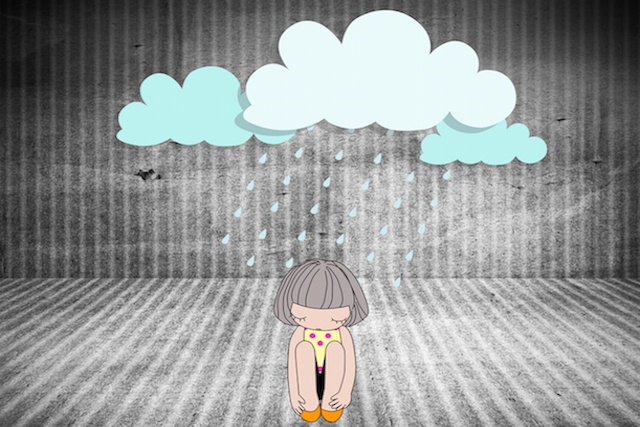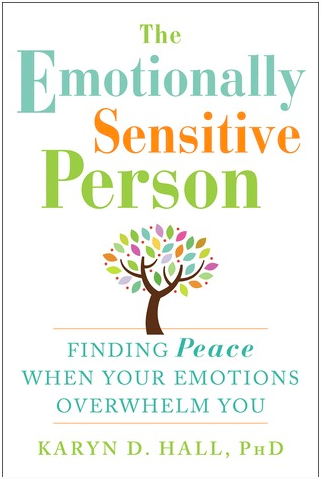
Update: The winners for this giveaway have been chosen:
You’re too sensitive. You’re making a big deal out of nothing. Why are you letting that bother you? Why can’t you just let it go? Really, you’re crying? What’s wrong with you?
If you’re an emotionally sensitive person, like me, you may have heard some of these phrases throughout your life. And, like me, you may have concluded that your emotions made you tragically flawed.
For the longest time, I felt a deep sense of shame about my sensitivity. And I found it difficult to deal with everyday life—not just because I felt everything so deeply and often reacted irrationally, but also because I absorbed other people’s feelings as if they were my own.
I remember in elementary school when most of my peers had to get shots from the school nurse. I’d already gotten one at my pediatrician’s office, so I sat in the hallway as, one by one, they approached her office to meet certain doom.
I could recall the fear and dread I’d felt in the moments before the needle pierced my skin, and I relived it, over and over again, as each student approached the door. In fact, my vicarious anxiety was so intense that I threw up, right there in the hallway.
I didn’t just empathize with their pain—I felt it. Deeply. And repeatedly.
I constantly felt emotionally overwhelmed, and often confused about the root of my feelings. All I knew was that I hurt—a lot—and I wanted to make it stop.
When I first realized I wasn’t alone with my emotional sensitivity, it was like someone rubbed a soothing balm on the achy heart I wore on my sleeve.
And it was even more liberating to realize I could leverage my sensitivity for good, as I have through Tiny Buddha.
Suddenly, it wasn’t something I had to hide; it was something I could openly acknowledge and harness in a positive way.
Still, I’ve had to work at managing my emotions, and I’ve had to learn to challenge destructive thoughts and behaviors that only exacerbate my pain.
If you too experience intense emotions, you don’t need to feel bad about yourself, or powerless to your heightened sensitivity.
Psychologist Karyn D. Hall has written a life-changing book that can help you manage your emotions so they don’t take over your life.
The Emotionally Sensitive Person: Finding Peace When Your Emotions Overwhelm You offers proven strategies to identify emotional triggers, challenge negative thought patterns, and recover from emotions more quickly.
I wish I’d read this book years ago. It’s insightful, practical, and chock-full of effective strategies to transform your sensitivity from a burden to a gift.
I’m grateful that Karyn took the time to provide some incredibly detailed answers to my questions about emotional sensitivity, and that she’s provided two free copies of The Emotionally Sensitive Person for Tiny Buddha readers.
 The Giveaway
The Giveaway
To enter to win one of two free copies of The Emotionally Sensitive Person:
- Leave a comment below
- For an extra entry, tweet: Enter the @tinybuddha giveaway to win a copy of The Emotionally Sensitive Person http://bit.ly/1KZGNnL
You can enter until midnight PST on Friday, May 22nd.
The Interview
1. Tell us a little bit about yourself and what inspired you to write this book.
I’m a therapist who works with emotionally sensitive people and I’m an emotionally sensitive person too.
I noticed that many people were suffering because they felt different, rejected, and flawed because of their emotional sensitivity. Many of them had heard statements like, “You’re just overreacting,” and “Stop being so dramatic,” for most of their lives.
In my work I found that if emotionally sensitive people could understand and accept their sensitivity, and not judge themselves because of it, that could ease some of the suffering they experience. I also believe that learning to manage intense emotions is part of decreasing their suffering.
Being emotionally sensitive is not an illness, but it does mean you are more vulnerable to anxiety and depression and other disorders. Judging and hating yourself for being sensitive is part of the pain and suffering that happens.
I wanted to write a book that could help emotionally sensitive people accept their sensitivity and learn to manage their intense emotions to help them live the life they want to live.
2. What causes emotional sensitivity?
Emotional sensitivity is biological. Research shows that some individuals are born with more intense emotions, meaning you react faster to emotional situations, your emotions are more intense, and your emotions take longer to fade. Events in a person’s life could also influence that emotional sensitivity.
3. Emotionally sensitive people, like myself, often feel shame for being this way. What can help people like me feel less ashamed, more accepting, and perhaps even proud of their emotional sensitivity?
First of all, ask yourself if the shame you experience is based on facts. All emotions have a purpose, and the role of shame is to keep you from behaving in ways that would get you kicked out of groups that are critical to your survival.
Most likely being an emotionally sensitive adult will not get you kicked out of important groups. Is the shame from being judged by others as flawed? Perhaps as a child? Maybe from people who didn’t understand? Perhaps give some thought as to what specifically the shame is about and how it came to be.
So if shame is not justified, that being emotionally sensitive is not something that warrants shame, then consider that the way to overcome shame is to do the opposite behavior to that which shame urges you to do.
Shame urges you to hide. So the opposite behavior is to not hide. To do the opposite is to look people in the eye, and stand up proud of your sensitivity. When people say, “You’re overreacting,” respond with pride, “Actually, this is exactly how I feel—I feel emotions intensely.”
Many times it is the discomfort that other people have with emotions that leads them to criticize your emotional reactions.
Our culture tends to value logical, analytical thinking. That doesn’t make their way better. In fact, emotionally sensitive people are the ones who become passionate about causes and make changes in the world. They are artists and caregivers and those who contribute to humanity.
The positives of being emotionally sensitive are often overlooked. If you consider it very carefully, what could or are you proud of about your emotional sensitivity? Make a list and review it often. Keep the positives in your mind to help you keep a balanced view of your emotional sensitivity.
Let yourself really see what your sensitivity is about—check out reality and let go of myths you might have accepted along the way about the “wrongness” of emotional sensitivity. Do you care intensely about others? Do you express yourself authentically?
Another idea is to practice self-compassion in place of judging yourself. Respond to yourself as you would a friend who feels emotions strongly.
If your emotional sensitivity leads to depression or anxiety or to behaviors that you know are not effective or helpful, then focus on changing the behaviors and learning ways to manage your emotional sensitivity that work for you rather than judging your sensitivity.
It’s not wrong, it’s just different. Judging your sensitivity is like judging yourself for how short or tall you are. It just is. It’s not helpful to continually berate yourself for your height, and in the same way seeing your sensitivity as wrong or yourself as flawed only adds to your distress and suffering.
4. What are the two different types of emotional sensitivity, and how do they manifest?
The two types I’ve identified are reactive and avoidant. People who are reactive act on feelings without thinking and are very quick to respond to emotional triggers. They have strong impulses that come with their emotions. They can be spontaneous and fun and also may act in ways that cause difficulties for themselves.
The avoidant type attempts to push away or avoid uncomfortable emotions and/or situations. The avoidant type might not attend gatherings if someone at the event was upset with her and would avoid other situations that might involve difficult feelings, such as confronting someone who owed her money or saying no to someone who asked for a favor.
5. What are some things we can do to improve our ability to manage our emotions?
There are many options to improve your ability to manage your emotions. One area is prevention.
This means that you make sure that you get sufficient sleep, eat a nutritious diet, take prescribed medications, take care of your physical health, exercise, and create positive experiences to build your resiliency. Work to develop safe and emotionally intimate relationships so you have a support network.
Let go of judging, stop avoiding your emotions, learn ways to change your emotions, and stop feeding or building difficult emotions. The book discusses the specifics of these ideas. In addition, I have a subscription website opening soon called DBTCoaching.com that focuses on coping skills.
6. You wrote that emotionally sensitive people tend to “catch” other people’s emotions. Can you tell us a little about this, and how we can stop doing it?
Emotionally sensitive people are often tuned in to the emotional experiences of other people, so much so that they may experience the emotion that someone else is having. If you are with someone who is sad, you may feel sadness too, for example.
Awareness that you are experiencing an emotion that actually belongs to someone else is helpful in letting go of it.
If someone is relating an experience that made them sad, then you can say to yourself, “Not my experience, her experience,” to help maintain the boundary.
If you experience emotions that you imagine others might have, such as “She must be so sad,” then remind yourself that someone else’s experience is not necessarily the same as yours. For example, if someone is moving, he might be excited and happy instead of sad or scared or vice versa.
7. In reading the “Identifying Your Emotions” section of the book, I realized I’ve mislabeled many thoughts as feelings, compromising my ability to cope with my actual emotions effectively. Can you share a few examples of mislabeling thoughts as feelings, and how we can identify what we really feel?
Some examples of mislabeling thoughts as feelings can be as simple as, “I feel like I’ll never succeed,” “I feel like I don’t fit in anywhere,” and “I feel like I’m different from anyone else.”
Those expressions are actually thoughts. To be more accurate your would say, “I think I don’t fit in anywhere and that makes me sad,” and “I think I’m different from anyone else and that makes me sad.” Then you either challenge the thoughts or find ways to cope with the feelings that come with the thought.
It’s difficult to challenge statements when you express them as feelings. “I am scared because I think I’ll never succeed” gives you the information about both the feeling you are having and the thought.
You recognize that as a negative thought and you can challenge it. Is that statement true? In what situation do you think it is true? Do the facts back it up? If so, what do you need to do differently? The emotion of sadness would indicate coping skills to help you deal with that specific emotion.
8. In Chapter 6, you wrote, “Judgments hide primary feelings.” What did you mean by this—and how can we challenge our judgments?
We often judge when we are emotionally upset. “He is a complete jerk,” is a judgment. What led to that thought and emotion? Maybe you were embarrassed because you spilled wine all over yourself and your date didn’t offer to help clean up. You use the judgment of him to cover the embarrassment.
“I spilled wine all over myself and I felt hurt that he didn’t help me clean it up,” might be more accurate.
9. The chapter that was most helpful to me personally was the one on decision-making—particularly the part about separating the decision from the emotion and accepting emotional consequences. Can you expand on this?
I’ve found that many emotionally sensitive people believe they can’t make decisions but they actually avoid decisions because of the emotional consequences of those decisions.
There are few choices that don’t have emotional consequences. Even picking a restaurant for a group dinner means someone will likely not agree with the choice and may be disappointed or critical. You know which restaurant you want, but you struggle with the decision because of the emotional consequences of the decision. You don’t want anyone upset.
If you can separate the two, the choice of restaurant and the emotional consequences of the choice, then you can be clear about what the issue is and how you want to manage it.
10. What do you think is the most important thing an emotionally sensitive person can do for their well-being?
Accept themselves as they are, completely and totally, and also work on changing behaviors that are keeping them from being effective in building the life they want to live.
You can find The Emotionally Sensitive Person on Amazon here.
FTC Disclosure: I receive complimentary books for reviews and interviews on tinybuddha.com, but I am not compensated for writing or obligated to write anything specific. I am an Amazon affiliate, meaning I earn a percentage of all books purchased through the links I provide on this site.
Girl under rain clouds image via Shutterstock
About Lori Deschene
Lori Deschene is the founder of Tiny Buddha. She started the site after struggling with depression, bulimia, c-PTSD, and toxic shame so she could recycle her former pain into something useful and inspire others to do the same. You can find her books, including Tiny Buddha’s Gratitude Journal and Tiny Buddha’s Worry Journal, here and learn more about her eCourse, Recreate Your Life Story, if you’re ready to transform your life and become the person you want to be.
- Web |
- More Posts













 Though I run this site, it is not mine. It's ours. It's not about me. It's about us. Your stories and your wisdom are just as meaningful as mine.
Though I run this site, it is not mine. It's ours. It's not about me. It's about us. Your stories and your wisdom are just as meaningful as mine.
I’m a sensitive person too! I’m so sorry you had to go through so much pain when kids got their shots at your school, Lori. There is so much in this interview that spoke to me. I know I have trouble with decisions, in particular. I often can’t decide what to do so it’s encouraging to understand that this is just part of who I am and I can learn to work with it. Thank you, Karyn.
Cool Book, always open to support when life overwhelms!!
A coworker has told me on several occasions that I am to effected by the emotions of those around me and has told me it isn’t healthy to take all that on. I’ve found that really annoying because I think to be empathic and emotionally sensitive can be a good thing if done in an intelligent way. I’m looking forward to reading more about this.
Thanks for the blog. Love your writing. Would love to get this book too.
Wow. Just reading this blog, I relate completely! I thought maybe I was alone and doomed in life. Thank you So Much for sharing. Even if I don’t win A copy of this book, im grateful for have reading this interview. It has seriously given more hope than you know.
This “For the longest time, I felt a deep sense of shame about my sensitivity.” and this, “Emotionally sensitive people are often tuned in to the emotional experiences of other people, so much so that they may experience the emotion that someone else is having.” so true..
Tiny buddah seems to be one of the only places where i feel i can relate to people. Ive always presumed there was something wrong with me for being so nervous and scared and emotional all the time. I have forever been told how i ‘shouldnt let things bother me so much’, but how is that even possible? Its who i am… I love reading tiny buddah, especially when i am feeling doubtful of myself. I discovered it only last year and can safely say i am a much happier person one year on. Im still on a journey, and i hope i can continue it with tinybuddah. Thank you Lori!
I definitely want to put my name in for this giveaway! This article resonated so much with me so I can only imagine what the book would speak to me. I am an emotionally sensitive person and I’ve always felt shame for it. I recently went through a break up and my partner admitted that they couldn’t handle my emotional reactions to being hurt or sad, which in turn made me feel unlovable or broken. It’s a relief to know I dont struggle alone and that it doesn’t make me “wrong” or too much. I feel things deeply and reflecting back, my empathy and ability to fully feel my emotions seemed to challenge my partners emotional barriers. Regardles, I’d love to read more about this!
Beautiful! Thank you for sharing this xxx
A great read (but then so is most of the posts on tiny Buddha!)…so often people assume there is one right way to be and we all have to fit within it. As someone who often does not fit within this “right way,” I have spent time struggling with the aspects of me that make me who I am. I appreciate the time spent on this topic – thank you. Would love to see this book 🙂
This sounds like the perfect read for me. I am definitely an “avoidant” type and will do most anything to run into a situation or person that has caused me pain. The interview was very interesting and I’d love to read more! Thanks so much.
I just started making it a mission to read TinyBuddha daily. Every post is so inspirational. It’s nice to read other’s experiences and wisdom as they go through their own journeys. I’ve been overly critical to myself about my heightened level of sensitivity soooooo many times. This book sounds like an excellent tool and I’d love to check it out!
Sounds like an awesum book! Please enter me into the comp 🙂
Wow Lori this is completely new to me, but explains so much…I can see my mom as reactive and me as avoidant for most of my life…this is on my must read list soon…would love to win a copy but will read it one way or another…thanks for bringing this subject to us….
I think I am a sensitive person and take on other’s stress or depression and would love to stop. My son is extremely sensitive and I would love to know ways to help him with this. He is 12 and it is a balancing act for sure. Would love to give him some skills to carry with him throughout his life.
I was just discussing this exact thing with my Fiance this weekend. I am so highly emotional that I have such a hard time letting go. I even get angry when we start to talk about attachment just because it seems so easy to “just let go” but it is the hardest thing for me to comprehend. Urg. I feel our son will be the same way because he is so empathetic. Only time will tell. Thank you for the article.
I would love this. I am definitely an avoidant type.
I would love this. I am definitely an avoidant type.
Definitely have always had a problem with this issue in romantic relationships…would love to be stronger and more emotionally intelligent
I recall being deeply sensitive as child and how much trouble it caused in my relationships. Now my daughter is experiencing the same thing. I pray for her to realize her strength and find peace.
Interesting, I am defiantly the avoidance type. When I was younger I would avoid saying ‘hi’ to people and avoid certain gatherings if things weren’t just right. It is great that people are more honest about these things now, and it is nice to know that people like me aren’t simply an outlier.
I actually seem to have both avoidant and reactive patterns. I can spend countless hours worrying about my reactions feeling anxious and not wanting to leave the house. I hate that my sensitivity is not under control. I recently read how we compensate to try to appear like everyone else. Very interesting
Wow– how many times have I heard in my life that I’m over-sensitive to things? How often have I considered myself as some kind of broken person because I experience emotions? I see it in my son, too. I’ll be getting and reading this book one way or another.
I definitely wear my heart on my sleeve being a sensitive passionate person.
Thank you for providing such insight on how to deal with issues in new ways.
I’m over sensitive to the fact that I’m over sensitive! I’m grumpy and defensive before people have even spoken to me. I expect hassle, I expect name calling and criticism. So I stay home more or avoid people where I can.
This sounds like an incredibly helpful book. Even that short interview was illuminating.
Until I read this I honestly thought I had a mental sickness because I could feel others pain. I would be tortured day by day with everyone’s pain, along with my own. Thank you for opening my eyes and providing tools to turn this into a positive!
I just learned about Highly Sensitive People a couple of years ago and am still navigating my way through this: I’d love this book!
This book would be such a great thing for me to read! I would truly appreciate winning this!!
Wow. Thank you so much for reminding me I’m not unique or broken. I am definitely hoping to win this book, but if I do not, I will buy it for myself. This exact characteristic has cost me almost every friendship I have ever had.
Good read. I think it’s interesting to read the comments, especially those who are highly sensitive and have children who are also. My children and I are highly sensitive people.
This would be really helpful to me!
This book would not only be helpful for myself but better working with my patients!
I have BPD and struggle with emotions. I’ve always balled my eyes out when I’m happy for someone. I cry when I’m overwhelmed by any emotion really. This book sounds really interesting 🙂
My sensitivity was put down by many people growing up. It took a while, but I eventually came to see it as a gift. I worked on having better boundaries and being assertive and that helped a lot. I love being sensitive now, but I do not let people walk all over me, nor do I “absorb” or take on the feelings of others. I also seem to attract many sensitive friends as well.
I too am deeply sensitive. Growing up, I had a very hard time managing my emotions. I often let little things bother me and still do frequently. I am also such a worrier! It’s really eye opening to read this and understand that there are others out there who feel the same. I have been working on going with the flow and not sweating the small stuff. This article was very helpful. Thank you.
I would love to read this book 🙂
I’d love to win the book….lord knows I need all the help I can get with my emotions and sensitivities!
So happy it’s not just me! Sometimes other people’s pain overwhelms me.
I could really use this book!! I’ve ALWAYS been a bit “sensitive” and caught flack for it ALL my life…matter of fact I’m pretty sick of catching flack for it..I am who I am.
Sounds like an amazing book – I only learned of this term recently, but everything I have learned has given me a better understanding of my own reactions to things.
Avoidance doesn’t work. It’s important to learn how to manage this quality in oneself.
Being a sensitive person seems like a curse, but it’s a blessing in disguise-we do feel more than the most, but our lives are therefore more intense and colorful. We can fall in the abyss of pain and depression, but we can also experience the heights of love, compassion and bliss others can only read about in novels. I wouldn’t want to be any other way.
Brilliant article. I draw great comfort from the saying ” It is both a blessing and a curse to feel so deeply”.
Slowly teaching my husband about my sensitivity, I love to show him things like this for when I can’t explain why I’m this way.
Wow! I totally need this book in my life!
I’ve been looking for a book like this!
I would love this book. I am a counselor and could use it for my clients. Thanks!
My late stepmother always said I was highly sensitive and I thought she was wrong. But I realize that deep feelings I have are suppressed and then when they do surface, they’re more intense. I now cry at everything, and it’s affecting my ability to move.forward. I hope.this.book will help me to.convert overwhelming emotions into empathetic action.
Very interesting! Here’s my entry!